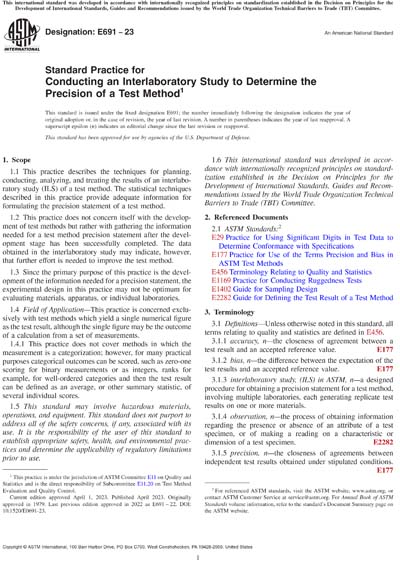Most recent
ASTM E691-23
Standard Practice for Conducting an Interlaboratory Study to Determine the Precision of a Test Method
1.1This practice describes the techniques for planning, conducting, analyzing, and treating the results of an interlaboratory study (ILS) of a test method. The statistical techniques described in this practice provide adequate information for formulating the precision statement of a test method.
1.2This practice does not concern itself with the development of test methods but rather with gathering the information needed for a test method precision statement after the development stage has been successfully completed. The data obtained in the interlaboratory study may indicate, however, that further effort is needed to improve the test method.
1.3Since the primary purpose of this practice is the development of the information needed for a precision statement, the experimental design in this practice may not be optimum for evaluating materials, apparatus, or individual laboratories.
1.4Field of Application - This practice is concerned exclusively with test methods which yield a single numerical figure as the test result, although the single figure may be the outcome of a calculation from a set of measurements.
1.4.1This practice does not cover methods in which the measurement is a categorization; however, for many practical purposes categorical outcomes can be scored, such as zero-one scoring for binary measurements or as integers, ranks for example, for well-ordered categories and then the test result can be defined as an average, or other summary statistic, of several individual scores.
1.5This standard may involve hazardous materials, operations, and equipment. This standard does not purport to address all of the safety concerns, if any, associated with its use. It is the responsibility of the user of this standard to establish appropriate safety, health, and environmental practices and determine the applicability of regulatory limitations prior to use.
1.6This international standard was developed in accordance with internationally recognized principles on standardization established in the Decision on Principles for the Development of International Standards, Guides and Recommendations issued by the World Trade Organization Technical Barriers to Trade (TBT) Committee.
ASTM International [astm]

